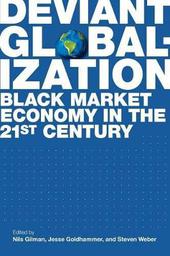
|
Deviant Globalization: Black Market Economy in the 21st Century
Paperback / softback
Main Details
| Title |
Deviant Globalization: Black Market Economy in the 21st Century
|
| Authors and Contributors |
Edited by Dr. Nils Gilman
|
|
Edited by Jesse Goldhammer
|
|
Edited by Dr. Steven Weber
|
| Physical Properties |
| Format:Paperback / softback | | Pages:320 |
|
| Category/Genre | International economics |
|---|
| ISBN/Barcode |
9781441178107
|
| Classifications | Dewey:337 |
|---|
| Audience | | Professional & Vocational | |
|---|
|
Publishing Details |
| Publisher |
Continuum Publishing Corporation
|
| Imprint |
Continuum Publishing Corporation
|
| Publication Date |
24 March 2011 |
| Publication Country |
United States
|
Description
This collection of essays introduces the thriving illicit industries and activities within the global economy whose growth challenges traditional notions of wealth, power, and progress. Through essays contributed by leading experts and scholars, "Deviant Globalization" argues that far from being marginal, illicit activities are a fundamental part of globalization. Narcotrafficking, human trafficking, the organ trade, computer malware, transnational gangs are just as much artifacts of globalization as are CNN and McDonald's, free trade and capital mobility, accessible air travel and container shipping. In fact, almost every technology, process, and regulation that enables mainstream globalization is an enabler of deviant globalization. This unique book explains why understanding deviant globalization as a systemic and integral part of globalization is crucial for setting up policies that will maximize the benefits of globalization and minimize its ill effects. Going beyond the usual pro/con arguments about globalization, "Deviant Globalization" seeks to initiate a critical debate about the choices it presents to governments, firms, supra-national organizations, and individuals. An accessible treatment of the underbelly of globalization, the book offers a systematic treatment of the difficult policy choices that it creates and describes a much more complex and symbiotic relationship between illicit and mainstream globalization.
Author Biography
Nils Gilman is Senior Practitioner at Monitor 360, a San Francisco based group that helps organizations make sense of complex geo-strategic issues. He is the author of Mandarins of the Future: Modernization Theory in Cold War America (Johns Hopkins University Press, 2003). Jesse Goldhammer is a principal at Deloitte Consulting, where he helps government, philanthropic and corporate clients develop innovative solutions to vexing challenges. He is the author of "The Craft of Incentive Prize Design" (Deloitte University Press, 2014) and The Headless Republic: Sacrificial Violence in Modern French Thought (Cornell University Press, 2005). Steven Weber is Professor, Political Science and School of Information UC Berkeley, and advisor to Monitor 360, San Franciso, USA.
ReviewsThis carefully curated selection of provocative and accessible essays helps us come to grips with the dark underside of the global economy, and sheds new light on what we can and should do about it. - Peter Andreas, Professor of Political Science and International Studies, Watson Institute for International Studies, Brown University Deviant Globalization shows the dark side of global trade, the illicit flows, black markets, and trafficking in drugs and human bodies that are as much a part of the new world (dis)order as multinational corporations and instant financial transfers. Contributors push us towards a more complete moral and political assessment of globalization and the development of better theories to account for power relations, inequalities, and collateral damage. - Craig Calhoun, President, Social Science Research Council In the shadows of the move to a globalized economy, in places its uncritical partisans would rather not look, an equally new and equally globalized set of phenomena has arisen. In this pathbreaking book, Nils Gilman, Jesse Goldhammer, and Steven Weber have gone far beyond registering the existence of 'deviant globalization.' They have theorized it, and shown that what crops up at the intersection of ethical disparity and regulatory inefficiency is now a permanent feature of global affairs. Observers of the world will benefit from this insight, while teachers and students will gratefully thank the editors for compiling the evidence in one place. - Samuel Moyn, Columbia University, author of The Last Utopia: Human Rights in History
|